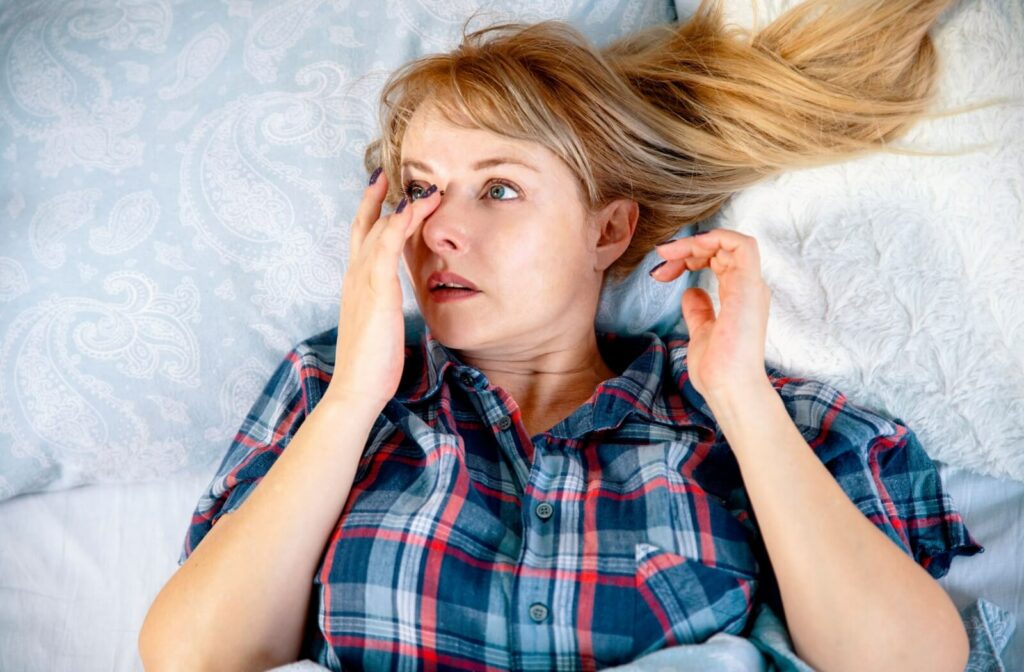Waking up with dry, irritated eyes isn’t the best way to start your day. If you find yourself rubbing your eyes first thing in the morning or reaching for eye drops as soon as you wake up, you’re not alone. Morning eye dryness is a common issue with a variety of possible causes, from environmental factors to underlying eye conditions.
Whether you wear contact lenses, spend long hours in front of screens, or simply experience occasional discomfort, understanding the root of the problem can help you find relief. Exploring the causes of morning dry eye can uncover simple, effective solutions to help your eyes feel more refreshed and comfortable when you wake up.
What Causes Morning Dry Eyes?
There’s no one reason why your eyes are dry when you wake up. It’s often a mix of environmental, health, or lifestyle factors. Here are some of the common culprits:
Dry Bedroom Air
The air in your sleeping space plays a big role in your eye health. If you’re sleeping in a room with low humidity, your tear film (the protective layer of moisture on your eyes) may evaporate faster. The result? Dry, irritated eyes when you wake up.
Fan or Air Conditioning Use
While fans and air conditioners keep us cool and comfortable during the night, they can also contribute to increased eye dryness. In particular, constant airflow while you sleep can decrease the moisture levels in your eyes.
Allergic Reactions
Whether it’s pet dander, dust mites, or pollen, allergies can inflame your eyes and lead to morning dryness. Allergies aren’t just seasonal; they can affect you year-round, depending on your environment.
Incomplete Eyelid Closure
Did you know some people sleep with their eyes slightly open? This condition, known as lagophthalmos, exposes the cornea to air throughout the night, leading to discomfort when you wake up. It can even increase your risk of infection over time.
Sleep Disorders
Conditions like sleep apnea affect your quality of sleep and can impact your eye health. Poor oxygen supply during sleep can affect the optic nerve, and the resulting fatigue may heighten symptoms like dryness or strain.
Medications
Certain medications, including antihistamines and some antidepressants, can interfere with tear production. If you suspect that your medication might be contributing to dryness, it might be time to talk to your healthcare provider.
Chronic Eye Conditions
Conditions like blepharitis (inflammation of the eyelids) and Sjögren’s syndrome (a condition that reduces moisture production in the eyes and mouth) may require more long-term management strategies.

Lifestyle Factors
Sometimes, specific lifestyle habits might contribute to the dryness you experience when waking up. Here are a few examples:
- Extended screen time: Using devices like smartphones or laptops before bed can strain your eyes and reduce natural blinking, leading to dryness.
- Contact Lenses: Wearing contact lenses for long hours or overnight diminishes the oxygen supply to your corneas, drying out your eyes.
- Dehydration: Sometimes the simplest solution can make all the difference. If you’re not drinking enough water, your tear production might be affected.
At-Home Solutions for Morning Dry Eyes
The good news is that you can take steps to reduce morning dryness and improve your overall eye comfort from the comfort of your own home. Here are a few remedies:
- Improve your sleep environment: Use a humidifier in your bedroom to maintain moisture levels in the air, especially in air-conditioned or heated rooms.
- Upgrade your sleep hygiene: Set a consistent sleep schedule and limit screen time before bed. You can also consider wearing a sleep mask to keep your eyes shut.
- Try artificial tears: Preservative-free artificial tears are an often quick remedy for dry eyes.
- Warm compresses: Warm compresses often stimulate tear production while providing immediate relief.
- Maintain eyelid hygiene: Your eyelids play an important role in keeping your eyes healthy. Use a gentle eyelid scrub or diluted baby shampoo to clean your eyelids regularly.
- Take breaks from contact lenses: If possible, give your eyes a break from contact lenses in the evenings and opt for glasses instead.
- Prioritize hydration & nutrition: Keep a water bottle handy throughout the day and aim to eat a balanced diet that supports overall hydration and eye health.
By incorporating these simple habits into your routine, you can create a healthier environment for your eyes and wake up feeling more refreshed and comfortable.
When Should You See a Professional?
If you’ve tried these at-home solutions and you’re still experiencing persistent morning dryness, it might be time to consult with a professional. Conditions like blepharitis, Sjögren’s syndrome, or incomplete eyelid closure may require targeted treatment to bring relief.
At Total Focus Optometry, our team specializes in personalized care designed to address root causes of dryness and discomfort. Whether it’s recommending treatments or crafting a care plan tailored to your needs, we’re here to help make your mornings brighter.



